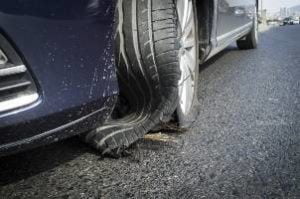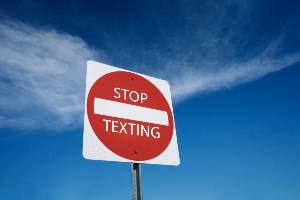Filing a Claim for a Crash Caused by a Tire Blowout
 Drivers have an obligation to ensure their vehicles are safe to operate. That means they need to ensure their vehicles do not pose an unreasonable risk of a crash.
Drivers have an obligation to ensure their vehicles are safe to operate. That means they need to ensure their vehicles do not pose an unreasonable risk of a crash.
That is why drivers need to make sure their tires are in good condition. Over or underinflated tires increase the risk of a blowout that could easily result in a crash. When a tire blows out, a vehicle becomes much more difficult to control.
Drivers need to make sure their tires are properly inflated and replace old tires when they become too worn down. Worn down tires can blow out, but drivers can also easily lose control of their vehicle because the tires cannot gain traction on the road. Worn tread is worse in rain or snow conditions.
Below, we discuss tire blowout collisions, including liability and filing a claim if you were a victim of one of these crashes. Victims of these crashes should discuss the situation with a licensed attorney as insurance companies are always looking to underpay or deny claims.
What Causes a Tire Blowout Crash?
There are various reasons why a tire may blow out. Sometimes a tire blowout is not the driver’s fault. For example, a tire could get punctured by a rock or nail. As air slowly drains from the tire and the driver accelerates to a high speed, pressure can build up in the tire.
Blowouts can also be caused by:
Old Tires
Tires wear down over time, preventing them from expanding and contracting as they should because of temperature or pressure changes. Older tires can get more easily damaged and blow out.
Overloading
If a vehicle is carrying too much weight, it puts tremendous pressure on tires. Weight includes cargo and passengers. Worn tires are also at much greater risk from an overloaded vehicle.
Potholes
Sometimes a pothole can damage a tire so severely that it blows out. A pothole can cause a tire to expand or contract quickly.
Impact Damage
If you run over debris, a tire could blow out a mile or two later. The damage could be much worse than you initially thought.
Defective Tires
There may be a design or manufacturing flaw with the tire that causes it to break down. The tread can separate from the rest of the tire and cause a blowout.
What Happens When a Tire Blows Out?
The driver of a car that suffered a tire blowout will likely hear a loud pop when it happens. Your vehicle is likely to slow down a little as the blown tire is not going to continue rolling like normal. The vehicle is likely to pull toward the side with the blown tire, making the vehicle harder to control.
If your vehicle is carrying a lot of weight, it may be particularly difficult to gain control. It may be much more difficult to get the vehicle safely off the road.
These are all reasons why vehicles with blown tires are often involved in crashes. Drivers often panic and try to slam on the brakes, which is the worst thing you can do.
When the blowout occurs while the vehicle is traveling at high speed, the crash could involve multiple vehicles as other drivers may not be able to avoid a collision.
Liability for a Tire Blowout Collision
Often, the driver of the car that suffered the blowout bears fault for the crash that results. The driver may have over or underinflated the tire, left an old tire on the car or not dealt with damage to the tire, such as from a nail.
In some cases, the repair shop that worked on the vehicle could bear fault – maybe they over or underinflated the tires or failed to notify you the tires were old. Mechanics may be liable for failing to do proper repairs or at least notify the driver of a problem that could be a safety issue.
Other drivers may be at fault for negligence during the collision. For example, if you were in a multi-vehicle crash, another driver may have been distracted, speeding or failed to stay in his or her lane. If multiple parties are at fault, liability would be shared among those parties.
If the tire blowout was a result of manufacturer negligence, they may be held liable for your damages.
Fortunately, Minnesota drivers can seek compensation for medical bills and some other damages from their no-fault insurance. That means you can recover compensation no matter who is at fault.
Fault would be an issue in a claim against another driver’s liability insurance, which means your lawyer would need to prove another party caused your damages through negligence. Proving fault for a blown tire crash can be complicated, which is why you should strongly consider working with a lawyer. At TSR, there are no upfront fees for our services, and we do not collect our fees unless you get compensation.
Preventing a Tire Blowout
Preventing a blowout is mostly about doing routine maintenance on your vehicle. Your owner’s manual will say the proper pressure for the front and rear tires and the maintenance schedule should tell you when tires should be rotated.
Take the car to a mechanic you trust to determine when tires are too worn down to drive on. That way you know when tires should be replaced.
Use caution in areas where there may be a lot of debris, such as near a construction site. If you hit debris or a pothole, you may want to pull over and check your tires. You should also slow down to lessen the impact of debris on your tires.
Call TSR Injury Law Today to Discuss Your Crash
Have you been injured in a crash caused by another driver?
Our Bloomington car crash lawyers are ready to discuss your potential legal options in a free consultation. We have assisted many crash victims and have obtained millions on their behalf. We know this is a difficult time for you and how important it is to secure compensation for damages.
Give us a call today. We are ready to help. (612) TSR-TIME


 Sometimes crash victims do not remember much of anything about their crash. Sometimes this is because they suffered a traumatic brain injury that has created gaps in their memory.
Sometimes crash victims do not remember much of anything about their crash. Sometimes this is because they suffered a traumatic brain injury that has created gaps in their memory. Although most vehicles on the road are loaded properly, sometimes, cargo can be improperly secured. Loose or falling cargo can create a dangerous hazard for other drivers. The cargo may fall off the back of a vehicle and cause a car crash, which may lead to serious injuries and significant property damage.
Although most vehicles on the road are loaded properly, sometimes, cargo can be improperly secured. Loose or falling cargo can create a dangerous hazard for other drivers. The cargo may fall off the back of a vehicle and cause a car crash, which may lead to serious injuries and significant property damage. Car crashes are usually the result of negligent driving. Many accidents are caused by speeding, distracted driving, violating another driver’s right of way or tailgating.
Car crashes are usually the result of negligent driving. Many accidents are caused by speeding, distracted driving, violating another driver’s right of way or tailgating. On Friday, Minnesota police and state troopers began their monthlong push to educate the public about the dangers of distracted driving and issue warnings and tickets to violators. April is National Distracted Driving Awareness month, when Minnesota and several other states look to crack down on distracted driving.
On Friday, Minnesota police and state troopers began their monthlong push to educate the public about the dangers of distracted driving and issue warnings and tickets to violators. April is National Distracted Driving Awareness month, when Minnesota and several other states look to crack down on distracted driving.